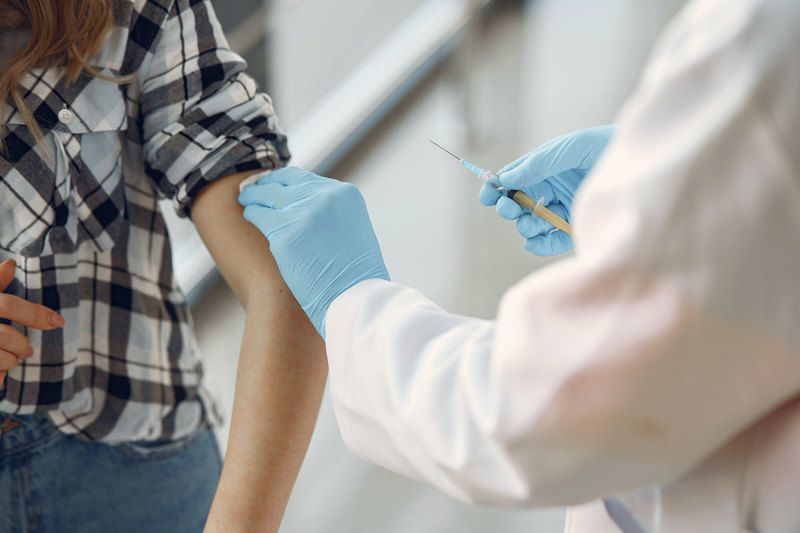T cells take the fight to Omicron
21 February 2022 | Story Claire Whitaker and Nobhongo Gxolo. Photo Pexels. Voice Cwenga Koyana. Read time 5 min.
University of Cape Town (UCT) researchers led an important new study published on 31 January 2022 in the prestigious scientific journal Nature. The publication, titled “T cell responses to SARS-CoV-2 spike cross-recognize Omicron”, shows that while the Omicron variant of SARS-CoV-2 can escape neutralisation by antibodies, it is not able to evade cellular immune responses.
On 26 November 2021 the newest SARS-CoV-2 variant, later designated Omicron, was described. Compared with the original virus, Omicron has over 30 mutations in the RNA sequence that codes for its spike protein (the protein that allows the virus to infect the body’s cells). Because antibodies target this spike protein, by changing the protein these mutations enable the virus to escape the neutralising effect of antibodies the body has produced during previous infection or as a result of vaccination.
The human adaptive immune response is broadly comprised of B and T cells; B cells produce antibodies, while T cells directly (CD8+) or indirectly (CD4+) participate in clearing infections. While antibody levels may be quick to rise – and fall – following infection, the T cell response is slower to initiate, but more durable.
Important questions
Would T cells generated in response to previous COVID-19 infection or vaccination recognise Omicron? Or is Omicron so different to previous SARS-CoV-2 variants that the immune system needs to start from scratch? These were some of the important questions investigated in this study.
Study co-leads Dr Catherine Riou and Associate Professor Wendy Burgers collaborated with a large team whose connections span South Africa and the globe to answer these questions. Researchers from the Africa Health Research Institute, the University of KwaZulu-Natal, the National Health Laboratory Service, the University of the Witwatersrand, the University of Pretoria, the University of California San Diego, the South African Medical Research Council, and Stellenbosch University, among others, participated.
“The world was looking for answers – would vaccines still be effective against Omicron?”
Within UCT, the team included members of the Institute of Infectious Disease and Molecular Medicine (IDM), the Wellcome Centre for Infectious Diseases Research in Africa and the Desmond Tutu HIV Centre hosted at the IDM, as well as the Faculty of Health Sciences’ Department of Medicine.
“We knew that we needed to answer this question as quickly as possible. The world was looking for answers – would vaccines still be effective against Omicron?” said first author of the paper, Dr Roanne Keeton.
“We pulled together our many collaborators from around the country to make this study possible, and literally worked night and day, seven days a week, to perform this research.”
T cells resilient in the face of a changed virus
The researchers found that both vaccination and COVID-19 infection induced T cell responses. However, both CD4+ and CD8+ T cell responses were lower in Omicron cases than in patients who had the original SARS-CoV-2 virus. Despite this, CD4+ and CD8+ T cell recognition of Omicron is largely preserved. This means that despite the changes in the spike structure from the original virus variant to Omicron, T cells were still able to recognise and respond to it.
“The second line of defence – T cells – can still recognise Omicron if you have been vaccinated or had COVID-19 previously. This is good news – its likely T cells that are keeping people out of hospital in this wave,” said Associate Professor Burgers.
“We looked at whether T cells from patients with Omicron infection made a similar response as patients infected with other variants from previous waves.”
In addition to extensive mutations in the spike protein, Omicron has 20 additional mutations in other proteins which could potentially enable it to evade T cells. However, the researchers found that these other mutations do not significantly affect a person’s ability to make a T cell response to Omicron after infection.
“We looked at whether T cells from patients with Omicron infection made a similar response as patients infected with other variants from previous waves – the original virus, beta and delta variants,” said Dr Riou.
“As far as the T cells are concerned, Omicron induces a similar immune response as other variants of concern, showing that T cells are recognising portions of the virus that haven’t changed over time,” Riou added.
Neutralising antibodies are not the only immune molecules of importance in the body’s internal war against SARS-CoV-2. While these short-lived and specific molecules lead the charge into battle, T cells’ durable, broad and inescapable attacks might prove the ultimate responders said Keeton.
 This work is licensed under a Creative Commons Attribution-NoDerivatives 4.0 International License.
This work is licensed under a Creative Commons Attribution-NoDerivatives 4.0 International License.
Please view the republishing articles page for more information.
UCT’s response to COVID-19
COVID-19 is a global pandemic that caused President Cyril Ramaphosa to declare a national disaster in South Africa on 15 March 2020 and to implement a national lockdown from 26 March 2020. UCT is taking the threat of infection in our university community extremely seriously, and this page will be updated with the latest COVID-19 information. Please note that the information on this page is subject to change depending on current lockdown regulations.
Minister of Health, Dr Joe Phaahla, has in June 2022 repealed some of South Africa’s remaining COVID-19 regulations: namely, sections 16A, 16B and 16C of the Regulations Relating to the Surveillance and the Control of Notifiable Medical Conditions under the National Health Act. We are now no longer required to wear masks or limit gatherings. Venue restrictions and checks for travellers coming into South Africa have now also been removed.
Read the latest document available on the UCT policies web page.
Campus communications
2022
UCT Community of Hope Vaccination Centre
On Wednesday, 20 July, staff from the University of Cape Town’s (UCT) Faculty of Health Sciences came together with representatives from the Western Cape Government at the UCT Community of Hope Vaccination Centre at Forest Hill Residence to acknowledge the centre’s significance in the fight against COVID-19 and to thank its staff for their contributions. The centre opened on 1 September 2021 with the aim of providing quality vaccination services to UCT staff, students and the nearby communities, as well as to create an opportunity for medical students from the Faculty of Health Sciences to gain practical public health skills. The vaccination centre ceased operations on Friday, 29 July 2022.
With the closure of the UCT Community of Hope Vaccination Centre, if you still require access to a COVID-19 vaccination site please visit the CovidComms SA website to find an alternative.
“After almost a year of operation, the University of Cape Town’s (UCT) Community of Hope Vaccination Centre, located at the Forest Hill residence complex in Mowbray, will close on Friday, 29 July 2022. I am extremely grateful and proud of all staff, students and everyone involved in this important project.”
– Vice-Chancellor Prof Mamokgethi PhakengWith the closure of the UCT Community of Hope Vaccination Centre, if you still require access to a COVID-19 vaccination site please visit the CovidComms SA website to find an alternative.
Frequently asked questions
Global Citizen Asks: Are COVID-19 Vaccines Safe & Effective?
UCT’s Institute of Infectious Disease and Molecular Medicine (IDM) collaborated with Global Citizen, speaking to trusted experts to dispel vaccine misinformation.
If you have further questions about the COVID-19 vaccine check out the FAQ produced by the Desmond Tutu Health Foundation (DTHF). The DTHF has developed a dedicated chat function where you can ask your vaccine-related questions on the bottom right hand corner of the website.
IDM YouTube channel | IDM website
“As a contact university, we look forward to readjusting our undergraduate and postgraduate programmes in 2023 as the COVID-19 regulations have been repealed.”
– Prof Harsha Kathard, Acting Deputy Vice-Chancellor: Teaching and Learning
We are continuing to monitor the situation and we will be updating the UCT community regularly – as and when there are further updates. If you are concerned or need more information, students can contact the Student Wellness Service on 021 650 5620 or 021 650 1271 (after hours), while staff can contact 021 650 5685.




















